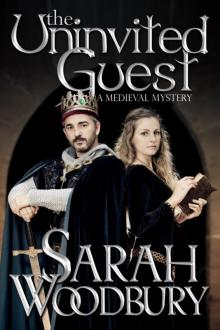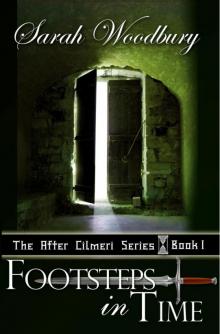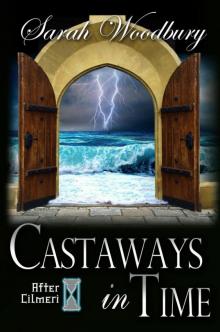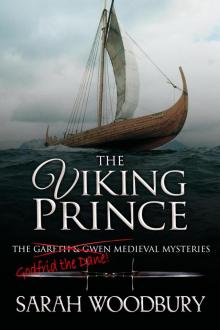- Home
- Sarah Woodbury
Guardians of Time Page 5
Guardians of Time Read online
Page 5
“Who among your people did you tell that you were going to Avalon?” Meg said.
Only half listening, David flipped the paper over, revealing a list thirty items long, which, when Meg looked closer, proved to be items that David intended to look up on the internet. Chief among them were the directions for making a gravity cell battery.
“I told as few people as I could,” David said. “I sent everyone I could home for Christmas, with the excuse that I was going to be with my family so they should be with theirs.”
“What about Bevyn? Why isn’t he here?” Meg said.
“He’s keeping Anglesey safe for me,” David said. “He can chew me out later for my dangerously reckless behavior.”
“And William?”
William de Bohun was David’s squire, who showed no signs of growing out of his hero-worship of David or his absolute belief that David was King Arthur returned. William was also one of the up and coming young nobles in England, among a cohort of men and women in their late teens and early twenties who would replace their fathers and mothers in the English House of Lords one day. In fact, it really should have been called the House of Lords and Ladies, but David wasn’t going to push the minor point having won the major victory of including women in the first place.
David smiled. “He protested the loudest when I ordered him home, but even he gave way. He’s in Hereford with his parents. If I hadn’t convinced him I’d be fine without him, he would have been first in line to come with us. He, too, is going to be ticked when he finds out where we went today.” David finally looked up from his clipboard. “It isn’t as if I mentioned it to the pope, if that’s what you’re really asking.”
“Have you heard anything more from him?” Meg said, because yes, that was what she’d really been asking.
“Archbishop Romeyn remains—ha, ha—” David broke off to laugh at the similar pronunciation of the two words, “—in Italy waiting to learn the details of this crusade the pope wants me to go on. I’m expecting an announcement after Epiphany.”
“That would make sense,” Meg said. “The pope often issues decrees about then.”
“That’s because it’s winter, and travel is difficult, so if the people the decree affects don’t hear about it until spring, it’s miles too late to do anything about it.” David bit his lip. “I miss Peckham already.”
John Peckham, the Archbishop of Canterbury, had died in early December. He’d been instrumental in putting David on the throne of England, and his replacement was another headache David would have to face after Christmas. David had his own candidates, but the canons of Canterbury cathedral would want their say, as would the pope.
Meg contemplated her son, who’d gone back to his list. While on one hand, it was perfectly normal for him to be worked up about traveling to the twenty-first century, she read more than that overt concern in his face and posture. He was agitated, and his intensity—never low to begin with—was roiling off of him in waves.
She took a stab at what was bothering him. “You’re the King of England, David, amazing as that seems. You don’t have to do anything you don’t want to.”
“Don’t I?” David gave a little laugh. “You’re right that this thing with the pope and the French king has me pretty worked up. I don’t want to go on Crusade this year—next year—ever. I don’t want to leave England at all, but I’m particularly worried about being forced to leave out of an obligation to the Church that I don’t personally feel, but which I might have to fulfill anyway. I’m hoping that between Romeyn and Geneville, they can figure out a way to get me out of it.”
“King Philip of France might not want to go either, and he—more than you—will do what best serves his own interests,” Meg said. “What Geoffrey needs to figure out is how your mutual interests align and a way to present an alternative plan to the pope—
one, in particular, that keeps the peace between England and France.”
Geoffrey de Geneville had been a confidant of King Edward, David’s predecessor, and David had considered him an ally only since the bombing of Canterbury Castle by Lee earlier that year. Geoffrey was currently in Paris, attempting to negotiate with the King of France. Given that King Philip had attacked England’s shores at Hythe with the explicit intent of undermining David’s rule—or even overthrowing him—Philip had some apologizing to do. So far, it hadn’t happened.
“You don’t have to solve all the world’s problems today, you know,” Meg said. “It will go spinning on even after we get off it, and whether or not you ever bring electricity to the Middle Ages.”
“I know,” David said, “but the fact that I was coming here was why I was pushing so hard on some things I might otherwise have left alone for a while longer.”
“What is your plan for getting back?” Meg said. “That’s another question I can’t believe I never asked you.”
David grunted what was almost a laugh. “I really have no idea. But I can tell you one thing—it isn’t going to be in this bus.”
Chapter Five
Bridget
“Did you see that?” Goronwy said.
Bridget knew her mouth had fallen open, but she couldn’t help it. One of her girlfriends back in Cardiff, before the time traveling, used to gape theatrically at any remotely surprising news. For a long while, Bridget had been convinced she did it on purpose, because it wasn’t possible for anyone to be shocked as often as she was. Eventually, however, Bridget decided her friend really was as innocent and (quite frankly) dim as she acted.
“I saw it,” Ieuan said, a little grimly. “Now maybe my heart can settle back into my chest.”
“I don’t believe it.” Goronwy’s hand was on the top of his head as he held the binoculars to his eyes with the other. He was still staring at the place where the bus had driven into the cliff wall.
“How can you not believe it?” Justin said. “You have been to Avalon, my lord. Did you think God’s grace would fail our king now?”
“No. No, of course not.” Goronwy dropped his arm.
Peter stood stoically next to the others, his arms folded across his chest. When he’d stepped off the bus, Bridget had gaped at him too and asked what he was doing.
“Staying,” was all he’d said, which was typical of him. Getting him to say anything at all, especially when in the company of others, was like pulling teeth.
From the start, Peter had been her liaison with Samuel, Callum’s sheriff. In the first few weeks after her arrival in Shrewsbury, Peter had made himself indispensable, building shelves and tables, helping her to carry and organize the wool, and encouraging her plans for selling her wares. In return, she’d fed him, and she’d thought they’d become friends.
Once she’d become an established businesswoman, however, he started to disappear for days on end, often at the behest of Samuel, Callum, or David. During the disaster at Canterbury, he’d been with David, and he’d been gone for nearly a month. When he returned, while he was as polite as ever, he stopped spending any real time with her. She hadn’t been able to figure out why, and it had taken her weeks of careful coaxing this autumn to convince him not to leave her shop within thirty seconds of walking into it.
Kissing him had been a mad impulse that if she’d stopped to think about before she acted she wouldn’t have done. At the very least, she’d assumed (had she stopped to think) that it wouldn’t have had any consequences until Peter returned from Avalon. They would both have had time to think about what the kiss meant to them, and if they wanted to be more to each other than friends.
But now he stood right beside her, as usual telling her nothing about what he was thinking. She wanted to assume that he’d stayed behind because the kiss meant something to him, but she could be totally and completely wrong. She found herself seriously annoyed with him, though that was unfair since it was she who’d kissed him.
Bridget had only done it in the first place because she’d been angry. Back on the bus, she’d been having an innocent conversat
ion with Meg, who’d noticed her unhappiness and thought it had to do with whether or not they were going to crash into the cliff face and die.
“It’s going to be okay,” Meg had said.
“Do you think I’m worried about this not working?” Bridget had shifted in her seat, tugging on the thighs of her jeans to adjust them. Her clothes hung more loosely on her than perhaps they had when she’d arrived in the Middle Ages, but she was still far too curvy for fashion in the twenty-first century. “That’s not it at all. I’m not looking forward to living there again.”
Meg pulled up one leg, probably marveling (in contrast to Bridget) at the freedom wearing pants gave her, and twisted in the seat so she was looking directly down the bus at Bridget. “Why not?”
“Why would I be?”
“Hot showers,” Meg said.
Bridget had managed a laugh at that. “You can only take so many of those.”
“Every day, actually.” Meg gestured to her clothing. “Getting to wear pants.”
“I look better in dresses.”
Meg had pursed her lips, unable to deny what was an obvious truth. Bridget had suitors lined up around the block looking to court her, though she herself had never given a single one the time of day, even if they didn’t seem to mind her size fourteen hips. In truth, not only did the value of being stick thin not exist in the Middle Ages, but the concept of overweight applied usually only to rich men who drank so much wine they got huge and suffered from gout.
Then Mark Jones, the former computer expert at MI-5 and currently Callum’s chief supply officer, had sat himself in the first row of seats that faced front, his laptop case beside him. He too had lost much of the pudge that had sat around his middle upon his arrival in the Middle Ages and had even learned to use a sword to defend himself. He might never be a warrior—or want to be one—but like Bridget, he’d discovered over the last year that his skills and brain were adaptable, even to a place without electricity. He’d become more than a computer whiz.
Bridget had swung around to speak to him. “What about you? Are you looking forward to living in the twenty-first century again?”
Mark had been focused on buckling his seatbelt, but he’d looked up at her question. “Me? I’m not staying. Didn’t you know?”
Bridget had stared at him. “What? We’re all staying. That’s the whole point.”
“That may be your point, and what David told you, but it certainly isn’t my plan,” Mark said. “I’m coming to help David get what he needs, but then I’m returning with him.”
“Why do you get to do that, and I don’t?” she’d said.
“I told him I’d come with him in the first place only if I didn’t have to stay,” Mark said.
Bridget’s eyes flashed. “You told David that? And he agreed?”
Mark shrugged.
Her lips in a tight line, Bridget had turned to look at David, who had been standing at the front of the bus talking in low tones with Callum and Peter. Bridget suddenly realized that none of them were staying in the twenty-first century, though nobody had thought to mention that fact to her until then.
Now, standing beside Peter with her heart in her throat, Bridget had no idea what to say to him. She’d kissed him, and he’d left the bus. And now the bus was gone, and the two of them were left in the Middle Ages. What had she done?
She put out a tentative hand to Peter. “I’m sorry—I mean—if you—” she stopped, knowing she was babbling, and then said with a rush, “I’m sorry you won’t get to see your parents.”
“It was my choice,” he said.
Bridget eyed him, hoping he’d add to the comment. He’d planned to return to the twenty-first century, and now—because of her—he found himself left behind. She opened her mouth, trying to think of a way to ask if he wanted to talk about the kiss, though that would surely be the most awkward conversation in history, especially standing on this bluff above the road with Ieuan, Goronwy, and Justin.
But before she could speak, Peter said, “After you left, David asked me if I would be willing to keep an eye on things here, and I said that would be okay with me.”
Only ‘okay’ didn’t sound very promising. “Did you ask Darren to talk to your parents?”
Peter nodded.
Bridget bit her lip. “At least they’ll know you’re alive.”
“It might be better if they didn’t.”
Bridget shook her head. “I’m pretty sure not knowing the truth is worse than knowing it—especially since you are alive, even if you can’t come home.” Bridget already knew that he had one older sister, who was married with two kids, which was good. If he’d been an only child, it would have been much harder for him to stay away.
Peter didn’t answer for a second. His eyes were on the other men, who were now conferring among themselves, probably deciding momentous issues of the realm. Then he spoke softly, “I could have stayed on the bus.”
With a swell of emotion, both for her and for him, Bridget felt for his hand, and he surprised her by not only allowing her to take it, but to keep it. The action gave her the courage to ask him another question. “Is this trip the reason you stopped talking to me this autumn?”
That got Peter to actually look at her. “Is that what you think happened?”
“After Canterbury, you hardly spoke to me unless I made you.”
Peter closed his eyes for a second. “You were going back, and I was never going to see you again.”
It was a relief to finally have that bit of truth spoken. “David had already conceived of this plan? That’s not what he told everyone.”
“I saw it in his eyes every time he talked about one of the bus passengers. About the deaths of Mike and Noah. About Lee,” Peter said. “Whatever he told us, or told himself, this has been a long time coming.”
“Why did David want you to stay behind?”
Peter lifted one shoulder. “He had a bad feeling that he shouldn’t take all of us to Avalon. That one of us at least would be needed here. I was relieved myself—up until the moment the bus disappeared into that cliff face. Now who knows what kind of trouble Darren’s getting into without me.” He shook his head. “I hate even to think.”
That was more words strung together in a row than Bridget had heard Peter say in months.
“Why was the king relieved?” Justin, David’s red-headed captain, had approached without Bridget noticing. All she could think about was her hand, which was still engulfed in Peter’s much larger one.
“He’s worried about what could happen here while he’s gone,” Peter said.
Justin looked affronted. “He doesn’t trust us.”
“I’m sure that isn’t it,” Bridget said.
The rain continued to fall, but Bridget was reluctant to move, even though there wasn’t anything more to do or see. Besides, if they left, she’d have to let go of Peter’s hand in order to mount one of the horses, of which she supposed she could have her pick, since there were so many extra, now that everyone who’d ridden in on them had gone. She felt the same reluctance in the men, since none of them were making any moves to leave either. It was as if they were held in suspended animation, waiting for the bus to return, even though they knew it wouldn’t. At least not today.
Then hoof beats sounded on the road from Llangollen. Everyone swung around to see who was coming. A member of Dinas Bran’s garrison reined his horse at the top of the road and dismounted in order to run forward to stand in front of Ieuan. “The queen sends word to King Dafydd—” He looked wildly around.
Ieuan glowered at the man, though David’s absence was hardly the messenger’s fault. “He isn’t here at the moment. What is it?”
The man ducked his head. “Your sister thought that might be the case. She asks that you—all of you—return to the castle. The English ambassador to France has come in search of King Dafydd.”
“Geoffrey de Geneville?” Ieaun said. “He’s supposed to be in Paris.”
“He was tr
aveling with an emissary from the French king. They were ambushed on the road not five miles from Wales, on the high road from Shrewsbury. And—” The man shifted from one foot to the other.
“And what?” Ieuan said.
The man looked pained. “If you could please come with me, the queen can explain everything.”
“At once,” Ieuan said.
The men dispersed. Bridget took one last look back at the place where the bus had disappeared, but since Peter was still holding her hand, and he was plainly intent on walking to where the horses had been left, she went with him rather than let go. “There’s nothing more to see here anyway,” she said under her breath, not necessarily for anyone’s ears.
For all that she’d founded her own business in Shrewsbury, Bridget felt herself to be an unlikely candidate for someone who would have done well in the Middle Ages. She hadn’t been educated at Cambridge like Callum nor had she been in graduate school in history or archaeology like Meg and Bronwen. A bunch of the others had been good in school. She could have told that just by looking at them, even before she learned that Rachel was a doctor or Darren, with years of night school, had worked his way from being a bobby on the street to MI-5.
She didn’t have a university education. Her parents had urged her to quit school at sixteen and get a job, and she hadn’t struggled against their wishes. School hadn’t been so much fun that she saw the point in continuing with it. Nobody in her family had ever gone to university, and it seemed silly of her to think that she would succeed at it either, especially when nobody else could see the worth of it or imagine her working a job that required a degree.
Her first job, then, had been in a handwork shop in Monmouth, not far from where she was born and raised on the English side of the Wye River. She’d worked there for three years before landing a job at a much bigger store in Cardiff, where she’d been for the last five.

 The Good Knight
The Good Knight The Irish Bride
The Irish Bride Refuge in Time
Refuge in Time Masters of Time
Masters of Time Prince of Time (Book Two in the After Cilmeri series)
Prince of Time (Book Two in the After Cilmeri series) The Favored Son
The Favored Son Unbroken in Time
Unbroken in Time![[The Lion of Wales 01.0] Cold My Heart Read online](http://i1.bookreadfree.com/i/03/22/the_lion_of_wales_01_0_cold_my_heart_preview.jpg) [The Lion of Wales 01.0] Cold My Heart
[The Lion of Wales 01.0] Cold My Heart The Uninvited Guest
The Uninvited Guest The Pendragon's Blade (The Last Pendragon Saga Book 2)
The Pendragon's Blade (The Last Pendragon Saga Book 2) Footsteps in Time
Footsteps in Time Castaways in Time (The After Cilmeri Series)
Castaways in Time (The After Cilmeri Series) Winds of Time
Winds of Time Of Men and Dragons (The Lion of Wales Book 3)
Of Men and Dragons (The Lion of Wales Book 3) Champions of Time
Champions of Time The Pendragon's Challenge (The Last Pendragon Saga Book 7)
The Pendragon's Challenge (The Last Pendragon Saga Book 7) Rise of the Pendragon (The Last Pendragon Saga Book 6)
Rise of the Pendragon (The Last Pendragon Saga Book 6) The Worthy Soldier
The Worthy Soldier The Last Pendragon (The Last Pendragon Saga Book 1)
The Last Pendragon (The Last Pendragon Saga Book 1) The Fallen Princess
The Fallen Princess The Pendragon's Champions (The Last Pendragon Saga Book 5)
The Pendragon's Champions (The Last Pendragon Saga Book 5) Cold My Heart: A Novel of King Arthur
Cold My Heart: A Novel of King Arthur A Long Cloud (The Lion of Wales Book 4)
A Long Cloud (The Lion of Wales Book 4) Frost Against the Hilt (The Lion of Wales Book 5)
Frost Against the Hilt (The Lion of Wales Book 5) Daughter of Time: A Time Travel Romance
Daughter of Time: A Time Travel Romance Outpost in Time
Outpost in Time Shades of Time kobo
Shades of Time kobo The Pendragon's Quest (The Last Pendragon Saga Book 4)
The Pendragon's Quest (The Last Pendragon Saga Book 4) The Unexpected Ally
The Unexpected Ally Crossroads in Time (The After Cilmeri Series)
Crossroads in Time (The After Cilmeri Series) The Viking Prince
The Viking Prince The Renegade Merchant
The Renegade Merchant Warden of Time (The After Cilmeri Series Book 8)
Warden of Time (The After Cilmeri Series Book 8) Ashes of Time (The After Cilmeri Series)
Ashes of Time (The After Cilmeri Series) Exiles in Time (The After Cilmeri Series)
Exiles in Time (The After Cilmeri Series) The Unlikely Spy
The Unlikely Spy The Fourth Horseman
The Fourth Horseman The Oaken Door (The Lion of Wales Book 2)
The Oaken Door (The Lion of Wales Book 2) Song of the Pendragon (The Last Pendragon Saga Book 3)
Song of the Pendragon (The Last Pendragon Saga Book 3) Champions of Time (The After Cilmeri Series, #13)
Champions of Time (The After Cilmeri Series, #13) Guardians of Time
Guardians of Time The Bard's Daughter (A Gareth and Gwen Medieval Mystery)
The Bard's Daughter (A Gareth and Gwen Medieval Mystery)